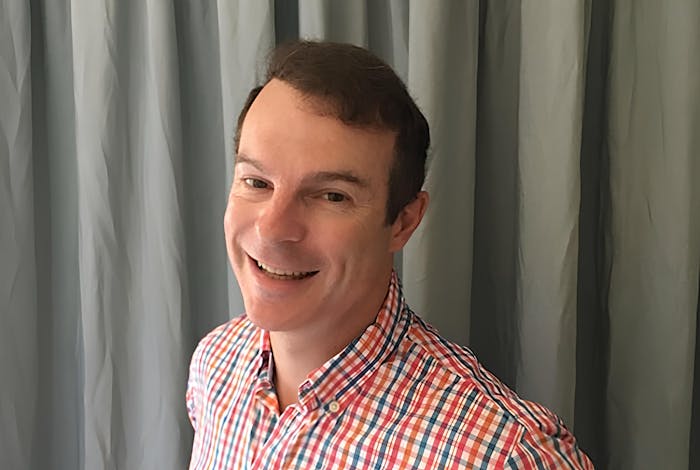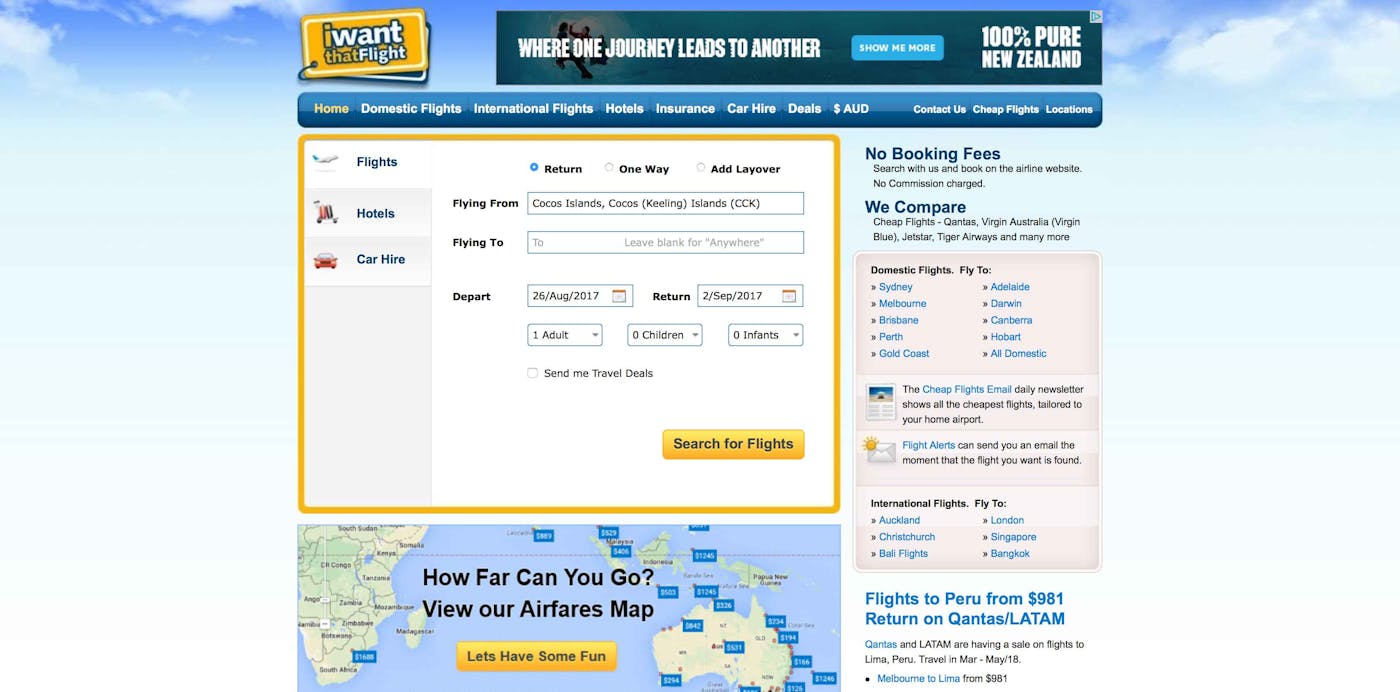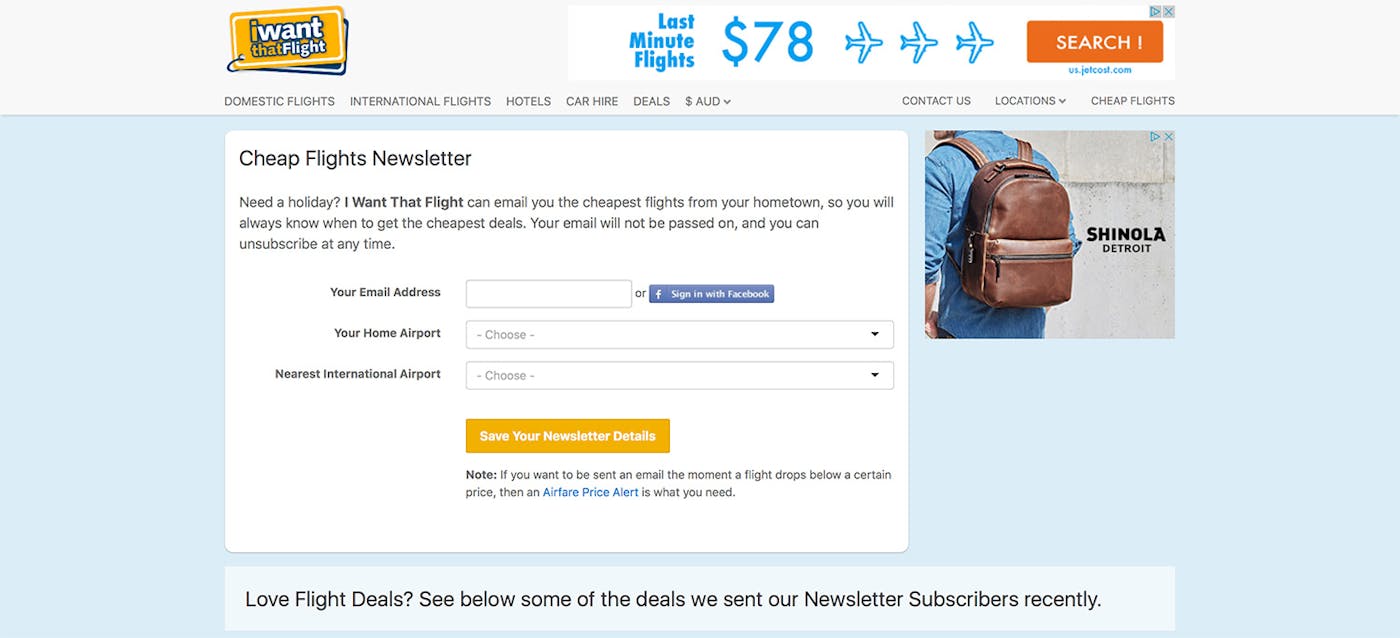In It for the Long Haul: Growing From 20¢/day to
$110,000/mo

Hi, I'm Garth Adams. I'm the owner of IWantThatFlight.com.au.
I started I Want That Flight in 2002. It compared airfares between all three of the major Australian domestic airlines.
In the last year I've really focused on the marketing side of things, and now it receives around 900,000 monthly visits, with a monthly revenue of $110,000.
I'm still the only full-time employee, though in the past few months I've taken on two part-time employees.
Coming Up With the Idea
I've been programming since primary school and have always worked on my own projects. After university, I worked as a developer for banks, insurance companies, and telcos. I'd already been building my own side projects for years when I started I Want That Flight in 2002.
Coming up with the idea was pretty simple. I wanted a way to compare airfares, and there was no way to do it without opening several browser windows.
It began as a personal project, so I was the only validation I needed. I just coded it and used it personally.

After a year I bought a domain name and set it up as a public site. Back then, the site only made money through a few Adsense banners. It was literally making 20 cents a day, but that was fine, since I had full-time employment.
Around 2005, Sudoku took off, and I was lucky enough to register sudoku.com.au. Within a few weeks I was getting enough traffic to sudoku.com.au that the income from a few ads was outperforming my full-time job. I quickly shifted to working on my own projects full time.
Over the years, as interest in Sudoku has dropped off, I've shifted my attention more and more to I Want That Flight.
Building the Initial Product
At the time I had used VB.net for my job, so I also used it to build the site (and I still use it today). Unfortunately, the development world has moved towards C# rather than VB, but I'm still happy with it.
Other tech decisions haven't been so great for me. I use ZURB foundation for the mobile version, and I wish I had chosen Bootstrap.
When you're a one-man shop, time is always a limitation. So I want to use products that have as big of an install base as possible so that all the bugs have been tested out and there is a large community you can learn from.
It's hard to keep a site like this running — I have to deal with 40+ airfare suppliers.
I Want That Flight has slowly evolved over the years. In the beginning I displayed the flight results in a calendar, since I thought that was the most useful. But the rest of the world decided that a list of airfares was easier to understand. It took me years, but I eventually adopted the list format as well.
Looking back on it, I should have gone with the "industry standard" much earlier, but I held out and maintained that the calendar view was worth taking the trouble for users to understand, because it would allow them to compare multiple days at once. These days, my mindset is that unless you have the resources to educate an entire market, it's better to stick with what people already know and understand.
Now that meta-search is well known I've found that the best approach is to restrict development to simply keeping up with the major features of Kayak, Skyscanner, and similar sites, and to spend the bulk of my time on marketing.
Attracting Users and Growing
In the beginning I only showed my site to family and friends, and I didn't do much with it for years. I slowly worked on it part time, adding features and going international, until the site reached 250,000 visits per month in 2012, where it stayed for several years.
Launching
The initial launch of I Want That Flight consisted of a single group email to my friends. This was way before sites like Hacker News, Product Hunt, or even Digg (remember Digg??). 20 or so people checked it out, and then... crickets.
I didn't really do any promotion for a few years. It wasn't until things were going well with sudoku.com.au that I came back and started spending time on SEO, which turned out to be a great driver of traffic. There are lots of different keywords to target in air travel. Think of all the airlines and all the cities they fly to, then try all the combinations — "Qantas Flights", "Qantas flights to Melbourne", "Qantas flights Melbourne to Sydney", etc. For a number of reasons, it was great to get started with SEO back then.
Current Strategies
These days, SEO in travel is incredibly saturated. And on Google, there are more ads and fewer organic results, and Google itself has its own products as well — Flights and Hotel search. Even though it's still worthwhile to invest in SEO, I've moved my efforts in two main directions:
Putting my marketing content on as many different platforms as possible. Each piece of content (both articles and ads, if possible) will go on my website and mobile apps (Android and iOS), Facebook, Instagram, various travel forums, and also to users via email. Each message is automatically tailored and posted to the given platform (FB, web, mobile, etc.) by programs I've written. Some sites like Instagram enforce a more manual approach, but I try to have everything as automated as possible.
I try to "own" the user as much as possible. What I mean by that is that once the user has found their way to my site, I try to get them to sign up for the email newsletter or download the app (as opposed to directing them to 3rd-party social media platforms). Having great SEO rankings or a huge Facebook page is great, but you are always at the mercy of Google/Facebook.

Business Model and Revenue Growth
There are many ways to make money with meta-search. A few are:
On-site advertising. You can also foster direct relationships with advertising companies.
Airlines and travel agencies pay for traffic that you send them. Either per visitor sent, or when a sale is made.
Email placements.
Back then, the site only made money through a few Adsense banners. It was literally making 20 cents a day.
Currently we don't take bookings. It's something my competitors are doing, so I am thinking about it — but adding full-time customer support is not something I take lightly.
I work with over 40 companies, so I completely automate reporting in order to keep on top of everything. Each supplier or advertiser gives me a daily or monthly report, and I use it to automatically generate invoices and to follow up on outstanding debts.
A few years ago I also set up an affiliate program so that bloggers and other travel sites could be paid for traffic they sent my way. This setup also had the unexpected bonus of providing me with a way to track the results of different advertising campaigns. By setting up each campaign or marketing channel as an affiliate, I can accurately attribute income to FB ads, Adwords, Outbrain, or other sources.
Goals for the Future
For the future I'd like to keep increasing traffic, and for this to happen I need to attract more international visitors. I tried moving into the US market at the start of the year, but the time zone difference proved to be a major obstacle.
I recently scaled that back and have instead turned to New Zealand. It's a similar market to Australia, with a lot of the same suppliers that I already have relationships with. And it only has a two-hour time difference from Melbourne. :)
Another big consideration is the constantly-changing tech landscape. It's hard to keep a site like this running — I have to deal with 40+ airfare suppliers. When a new platform comes along I have to decide how much time to invest in each one, which involves important tradeoffs. For example, do I develop (or pay for) an app for iPhone or Android? Currently, I'm paying a lot of attention to chatbots and voice-controlled apps.
Reconsidering Past Decisions
If I had to start over, I would probably move to B2B. A consumer-facing site like I Want That Flight has so much competition now (e.g. Skyscanner, Kayak, Google Flights) that it would be very difficult to launch without major funding.
The biggest thing I've had to learn is that adding new features won't bring in new visitors. I learned this specifically as the popular of sudoku.com.au waned. I could see traffic declining each month, and I frantically added features in the hope of reversing it. The existing audience loved the new additions, but this did nothing to bring in new users.
I think this is harder to face up to as a developer than for people from other backgrounds. We are comfortable coding, and are often uncomfortable (or outright hate) having to do marketing. Once I internalized that making the product better wasn't a realistic way for me to get more traffic, it became much easier to focus on marketing.
Most Helpful Advantages
My biggest initial advantage was being able to code it all myself. Ironically, I think this has now become a little bit of a hinderance as I am trying to expand. It is difficult to hand over responsibilities and make time for training if you've been doing it yourself for so long.
It began as a personal project, so I was the only validation I needed.
The best decision I've made recently was to start going to co-working spaces regularly. Apart from the social benefits (which was the main reason I started going), I am constantly learning about new technologies, as well as marketing and advertising opportunities, just by being around different people.
Here are some good books I recommend:
Startup Growth Engines — this is a book of 20 or so case studies of the growth strategies used by Uber, Snapchat, Square etc.
Traction — more growth case studies.
I also love business histories. In no particular order:
All great.
I also read marketing blogs (e.g. https://detailed.com/) and check out Product Hunt a lot for new ideas.
However, I only ever do this during my down time (e.g. on the train, reading over breakfast, etc.). Work time is for coding or actually putting marketing ideas into practice. Don't confuse reading blogs/reddit, etc., for work research.
Advice for Other Indie Hackers
Be sure about how you're going to market your product/website/app before you build it. This might mean building an email list, finding a forum of potential users that accepts advertising, having a popular YouTube channel, etc.
Unless you have the resources to educate an entire market, it's better to stick with what people already know.
The extra benefit of having an audience before you start is that you can get advice from them as you are building, increasing the chances that you build a product that users actually want (and will pay for).
Learning More
I don't really have a social media profile these days. If you post your questions in the comments I'll do my best to answer them.

Leave a Comment